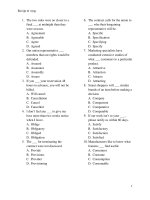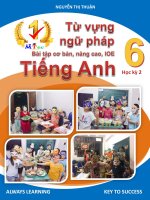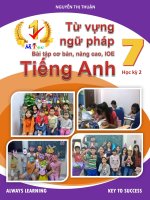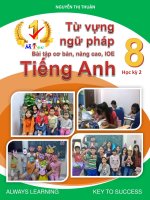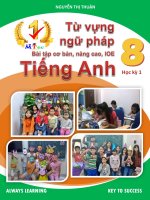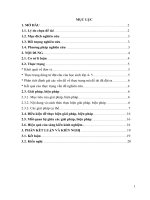Từ vựng, văn phạm, bài tập
Bạn đang xem bản rút gọn của tài liệu. Xem và tải ngay bản đầy đủ của tài liệu tại đây (143.5 KB, 6 trang )
UNIT 4: SPECIAL EDUCATION
VOCABULARY
Words and phrases Pronunciation Meanings
A. READING
1. admiring (adj)
[əd'maiəriη]
ngưỡng mộ
2. Braille (n)
[breil]
Chư õBray(chữ nổi cho người mù)
3. chance (n)
[t∫ɑ:ns]
cơ hội
4. describe (v)
[dis'kraibə]
mô tả
5. effort (n)
['efət]
nỗå lực
6. humorous(adj)
['hju:mərəs]
hài hước
7. infer (v)
[in'fə:]
suy ra
8. kid (n)
[kid]
trẻ con
9. one by one lần lượt
10. prevent … from (v)
[pri'vent]
cản trở
11. proud of (adj)
[praud]
tự hào về
12. prove (v)
[pru:v]
chứng minh
13. suspicious (adj)
[sə'spi∫əs]
nghi ngờ
14. thanks to (prep)
['θỉηks]
nhờ vào
B. SPEAKING
15. activity (n)
[ỉk'tiviti]
hoạt động
16. break (n)
[breik]
giờ giải lao
17. class (n)
[kla:s ; klỉs]
tiết học
18. to be honest (exp)
['ɔnist]
thành thật mà nói
C. LISTENING
19. Beauty (n)
['bju:ti]
vẻ đẹp
20. calm … down (v)
[ka:m daun]
trấn tónh (ai đó)
21. camera (n)
['kỉm r ]ə ə
máy ảnh
22. comprise (v)
[kəm'praiz]
gồm có
23. disability (n)
[,disə'biliti]
khuyết tật
24. escape (v)
[is'keip]
thoát khỏi
25. exhibit (v)
[ig'zibit]
triển lãm
26. fascinate (v)
['fỉsineit]
cuốn hút
27. feature (v)
['fi:t∫ə]
làm nổi bật lên
28. labourer (n)
['leibərə]
người lao động
29. mute (adj)
[mju:t]
câm
30. on display
[dis'plei]
được trưng bày
31. peaceful (adj)
['pi:sfl]
hoà bình
32. photograph (n)
['foutəgra:f ;
'foutəgrỉf]
bức ảnh (=photo)
33. photographer (n)
[fə'tɔgrəfə]
nhà nhiếp ảnh
34. photographic (adj)
[,foutə'grỉfik]
(thuộc) nhiếp ảnh
35. simple (adj)
['simpl]
đơn giản
36. subject (n)
['sʌbdʒikt]
chủ đề
37. surroundings (n)
[sə'raundiηz]
vùng xung quanh
38. wander (v)
['wɔndə]
đi lang thang
D. WRITING
39. advertisement (n)
[ỉdvə'taizmənt]
mục quảng cáo
1
40. air-conditioned (adj)
['eəkən'di∫nd]
được trang bò máy lạnh
41. complaint (n)
[kəm'pleint]
sự phàn nàn
42. contact (v)
['kɔntỉkt]
liên lạc
43. enclose (v)
[in'klouz]
gởi kèm
44. look forward to (v)
['fɔ:wəd]
mong đợi
45. quality (n)
['kwɔliti]
chất lượng
46. receipt (n)
[ri'si:t]
biên lai
47. refund (n)
[ri:'fʌnd]
sự trả lại tiền
48. resolution (n)
[,rezə'lu:∫n]
cách giải quyết
49. resolve (v)
[ri'zɔlv]
giải quyết
50. Service (n)
['sə:vis]
sự phục vụ
E. LANGUAGE FOCUS
51. ambulance (n)
['ỉmbjuləns]
xe cứu thương
52. delay (v)
[di'lei]
hoãn lại
53. give up (v) từ bỏ
54. injured (adj)
['indʒəd]
bò thương
55. offer (v)
['ɔfə]
tỏ ý muốn
56. put … up (v) cho (ai) trọ
57. rarely (adv)
['reəli]
hiếm khi
58. rob (v)/ robber (n)/ robbery (n)
[rɔb]
cướp
59. scene (n)
[si:n]
hiện trường
60. unemployed (adj)
[,ʌnim'plɔid]
thất nghiệp
PRONUNCIATION
Trong bài 4 này chúng ta sẽ học cách phân biệt giữa âm /ɔ/ (o ngắn) và /ɔ:/ (o dài)
1. /ɔ/ (o ngắn) : đọc như âm ót trong tiếng
Việt
Cách nhận dạng :
+ Gần như tất cả các chữ o mà phía sau có
một phụ âm
hot, not, box, job ....
+ ngoại lệ :
A đọc /ɔ/ : watch ,what,quantity...
- au đọc /ɔ/ : because,sausage ..
- ow đọc /ɔ/ : knowledge
2. /ɔ:/ : đọc o tròn miệng
Cách nhận dạng
- or : horse
- oar : board
- aw : saw ,lawn
- au : daughter
ngoại lệ :
- a : all ,water
- ar : warm,quarter
- oor : door ,floor
- our : four ,court,
- ou : bought
GRAMMAR
I. THE + ADJECTIVE (=COMMON NOUN)
Dùng để chỉ một nhóm người, động từ theo sau luôn luôn ở số nhiều.
the injured (người bò thương), the poor (người nghèo), the rich (người giàu), the sick (người bệnh), the
unemployed (người thất nghiệp), the young (người trẻ tuổi), the disabled (người khuyết tật), the blind
(người khiếm thò), the dead (người chết), …
Ex: The rich should help the poor.
II USE TO – BE USED TO + V-ING
2
1. Use to + infinitive: Used to expresses a past situation or habit that no longer exists at present (Diễn tả
thói quen trong quá khứ, đã chấm dứt ở hiện tại).
Affirmative:
Ex: I used to live with my parent. Now I live in my own apartment.
Negative:
Ex: I didn’t use to drink coffee at breakfast, but now I always have coffee in the morning.
Interrogative
Ex: Did you use to live in Ho Chi Minh City?
Ex: - Where did you use to live when you were abroad?
2. Be / get used to + V-ing ( Diễn tả thói quen ở hiện tại)
Ex: - I am used to driving on the left because I have live in Britain for a long time.
- He gets used to getting up early because he has to revise his lesson.
3. Be used for +V-ing/ Be used to+V-inf (Diễn tả vật gì đó được sử dụng vào mục đích gì …)
Ex: - This pen is used for writing.
- This pen is used to write.
IV. WHICH AS A CONNECTOR
Dùng để thay thế một mệnh đề được nói trước đó.(which thường đứng sau dấu phẩy)
Ex: Sheila couldn’t come to the party, which was a pity.
(Sheila không thể đến dự tiệc, đó là điều đáng tiếc.)
EXERCISES
A.TỰ LUẬN: Rewrite the sentences:
1. People today put on TV or in newspapers. This makes it possible to produce more things to sell
(using which connector)
………………………………………………………………………………………………………………………………………………………………………………………………………
2. Tim has found a new job. That is lucky (using which connector)
………………………………………………………………………………………………………………………………………………………………………………………………………
3. She came to work on time. That pleased her boss (using which connector)
………………………………………………………………………………………………………………………………………………………………………………………………………
4. They no longer play tennis (using used to)
………………………………………………………………………………………………………………………………………………………………………………………………………
5. I don’t go to the church every Sunday any longer (using used to)
………………………………………………………………………………………………………………………………………………………………………………………………………
6. We need to provide more shelters for people who are without place to live. (using the + adj)
………………………………………………………………………………………………………………………………………………………………………………………………………
7. People with severe disabilities need full-time care. (using the + adj)
………………………………………………………………………………………………………………………………………………………………………………………………………
8. People was injured in the accident yesterday was taken to hospital immediately.(using the + adj)
………………………………………………………………………………………………………………………………………………………………………………………………………
9. People do not have enough to eat should be helped. (using the + adj)
………………………………………………………………………………………………………………………………………………………………………………………………………
10. People no longer travel on foot. (using used to )
3
S + used to + V-inf ….
S + didn’t + use to + V-inf ….
Did + S + use to + V-inf ….?
S + get/ be (is, am, are) + used to + V-ing
Wh – word + did + S + use to + Vinf ….?
………………………………………………………………………………………………………………………………………………………………………………………………………
B. TRAÉC NGHIEÄM: Choose the best option for each sentence
1. She’s always annoying about something.
a b c d
2. Lake Superior, that lies on the US Canadian border, is the largest lake in North America
a b c d
3. My father didn’t ______________ coffee for breakfast
a. used to have b. use to have c. use to having d. use be having
4. A verb from “information” is _________________
a. to inform b. to informize c. to informate d. to informatize
5. The government is doing nothing to help ___________.
a. the poor people b. the poor ones c. the poor d. the pours
6. It rained all the time, ______________ was a
great pity.
a. that b. what c. which d. who
7. ___________you really need is a long holiday.
a. That b. What c. Which d. Who
8. I ________________like going to pop concerts when I was a teenager.
a. would b. used to c. must d. could
9. Rick left the party early because he _______________ a headache.
a. had b. has c. used to have d. was having
10. Claude didn't ___________ in Canada.
a. lived b. use to live c. used to live d. used to living
11. I remember you. You _______________ to school here.
a. were used to going b. have already gone c. went d. used to go
12. One day last March, I _______________ a very strange letter.
a. get b. got c. used to get d. was getting
13. Can you show me ______________the film in this camera?
a. how to change b. how change c. how changing d. how you changed
14. I didn't like the noise in the city at first. But now________________ here.
a. I got used to living b. I'm used to living c. used to live d. I used to living
15. Galileo ______________his first telescope in 1609.
a. builds b. built c. has built d. had built
16. Last summer, we had _______________-holiday in Spain.
a. a two week's b. a two-weeks c. two-week d. a two-week
17. Have you got the money ______________I lent you yesterday?
a. Which b. that c. x (nothing) d. all are correct
18. Robbie loves dog, but he ______________ one since Jacky, his favorite pet dog, died last year
a. hasn’t b. hasn’t had c. didn’t have d. hadn’t had
19. One who is unable to use a part of his / her body properly is called a ______________ person
a. disable b. dumb c. deaf d. retarded
20. When Mick went to the office last Thursday, he knew somebody ____________ there
a. has been b. had been c. went d. was being.
GENERAL EXERCISES OF UNIT 4
A. TỰ LUẬN
I. Give the correct form of the given verbs:
1. I (have) _______________________ coffee for breakfast every day.
4
2. They (begin) _____________________ to study at this school 7 years ago.
3. It (rain) _________________________ very much in the summer.
4. Bad students never (work) _________________________ hard.
II. Rewrite the sentences:
1. Dennis gave up smoking two years ago. (using used to)
----------------------------------------------------------------------------------------------------------------------------
2 When Barbara was in Italy, she stayed with an Italian family. (using used to)
---------------------------------------------------------------------------------------------------------------------------
3. People who have lots of money have comfortable lives. (using the + adj)
--------------------------------------------------------------------------------------------------------------------------
4. We live near a special school for people who can’t hear. (using the + adj)
----------------------------------------------------------------------------------------------------------------------------
5. They didn’t finish their work. That makes my teacher angry. (using which connector)
----------------------------------------------------------------------------------------------------------------------------
6. He ate too much. That made all of us very worried. (using which connector)
---------------------------------------------------------------------------------------------------------------------------
B. TRẮC NGHIỆM
I. PHONETIC:
Choose the word that has the underlined part different from others
1. a. follow b. job c. geography d. develop
2. a. all b. walk c. what d. water
Choose the word that has pronounced differently from others
3. a. prevent b. describe c. infer d. effort
4. a. subject b. escape c. simple d. service
II. VOCABULARY- GRAMMAR
5. The heavy rain prevented us___________ going out for a picnic.
a. on b. in c. from d. for
6. My teacher is proud ____________ my class.
a. on b. of c. from d. about
7. I went to school in ________________ morning.
a. the b. a c. an d. Þ
8. The President expressed his deep sorrow over the bombing deaths.
a. regret b. anger c. sadness d. passion
9. In spite of her deafness, she played the violin very well.
a. inability speak b. inability to see c. inability to hear d. mentally impairment
10. I have been fascinated by ______________ since I was at secondary school.
a. photograph b. photographic c. photographer d. photography
11. The aim of the LIVE project is to train students from developing _________________.
a. nations b. nationals c. nationalities d. nationalism
12. Tony: _________________________________?
Ann : In a house near Brighton.
a. What's your address? b. Where are you? c. Where you live? d. Where do you live?
13. subject/ you/ what/ best/ like
a. What best subject you like? b. What subject you like best?
c. What subject do you like best? d. What subject do you best like?
III. ERROR EDENTIFICATION
14. When I was a child, summers was used to be warmer and winters colder than now.
a b c d
5



